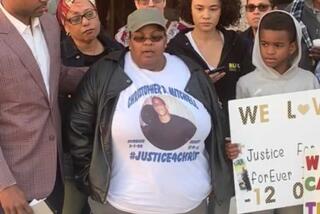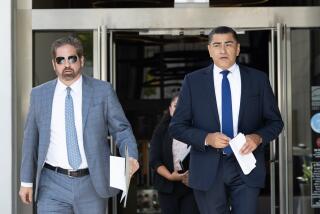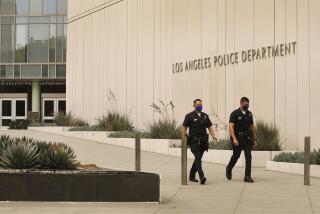Slander Suit Against George Michael Can Proceed
A sharply divided federal appeals court ruled Tuesday that a Beverly Hills police officer’s $10-million slander suit against singer George Michael can move ahead toward trial, reversing a lower court ruling that dismissed the case.
U.S. 9th Circuit Court of Appeals Judge Stephen Reinhardt issued a stinging dissent, saying that “by allowing the suit to proceed, the majority gives law enforcement officers a tool to silence speech on a topic of critical public importance -- police misconduct.”
The suit stems from a 1998 incident in which Michael was arrested for exposing himself in the bathroom of a Beverly Hills park. Michael, who was born Georgios Kyriacos Panayiotou, pleaded no contest to charges of disorderly conduct, was fined $810, placed on probation and required to perform community service.
Subsequently, Michael, who first came to prominence in the 1980s, gave several magazine and television interviews, including one on the “Late Show With David Letterman,”in which he accused Officer Marcelo Rodriguez of exposing himself and masturbating in front of the singer in an attempt to entrap him into committing a crime. Michael also released a music video that referred to the incident.
U.S. District Judge Consuelo B. Marshall dismissed the suit, ruling that Michael’s statements were non-actionable, nondefamatory expressions of opinion.
Rodriguez contends that he was slandered by seven separate statements Michael made in various interviews. On the Letterman show in November 1998, Michael said: “He played a game called ‘You show me yours, no, I’ll show you mine.’ It was called ‘I show you mine, you show me yours, and I’ll take you down to the police station.’ ”
The same month, on a British television program, Michael said, “I responded to a very handsome, tall, good-looking American cop, they don’t send Colombo [sic] in there to do this and so I was responding to that and I can’t be ashamed of the fact that it was there in front of me.”
Ninth Circuit Judges A. Wallace Tashima and Stephen S. Trott ruled Tuesday in San Francisco that Michael’s statements appear to support a claim under two categories of the state’s slander statute: charging someone with committing a crime, and injuring one’s professional reputation by accusing him of conduct that would disqualify him from his job.
“It is doubtful that the police conduct alleged -- the exposure of a police officers’ genitals and an act of masturbation in a public place -- is an accepted practice of the Beverly Hills Police Department in the conduct of undercover operations,” Tashima wrote in his majority opinion.
A jury “could conclude that Michael’s statements accuse Rodriguez of conduct that would disqualify him from service as a police officer, regardless of whether it was done to further an undercover operation,” Tashima added.
Reinhardt disagreed, quoting a California court decision holding that “sexual motivation is a prime requisite” for proving lewd conduct.
“It is not possible to say that any of Michael’s statements even hint that Rodriguez might have had a ‘sexual motivation’ or that anyone would believe that he might have been so motivated,” Reinhardt said. “Indeed, Michael explicitly stated that Rodriquez’s motivation was, to Michael’s chagrin, entirely focused on law enforcement.”
As a policy matter, Reinhardt said, the majority’s standard for letting the suit go forward “would ... convert almost every public statement regarding alleged police impropriety into a potential lawsuit by the officer accused of wrongdoing.
“If a citizen claimed that an officer was unnecessarily rough in effecting an arrest, or that an officer was verbally abusive without provocation, such statements would apparently subject the citizen to the threat of liability -- and at the least to the expense of defending a legal action,” Reinhardt wrote.
Consequently, Reinhardt continued, “many legitimately aggrieved individuals will simply remain silent.”
Rodriguez’s attorney Richard F.G. Thomas said Rodriguez was “very pleased” with the ruling. Michael’s attorney did not return a call seeking comment.
More to Read
Sign up for Essential California
The most important California stories and recommendations in your inbox every morning.
You may occasionally receive promotional content from the Los Angeles Times.










